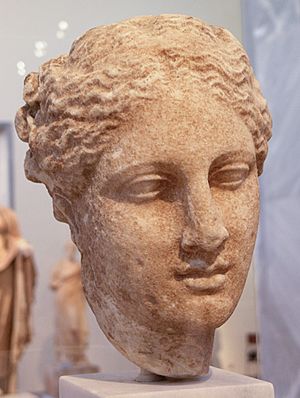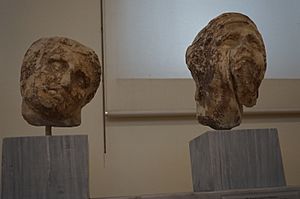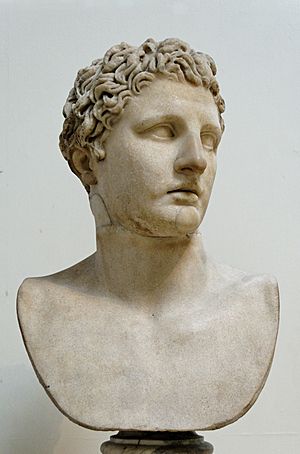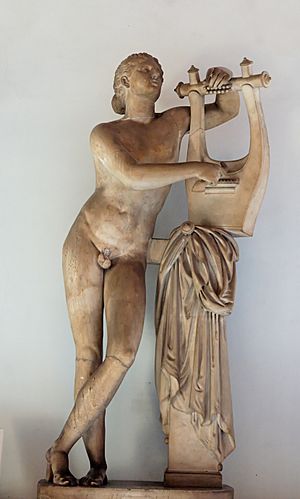Scopas facts for kids
Scopas (also spelled Skopas) was a very famous ancient Greek sculptor and architect. He lived a long time ago, from about 395 BC to 350 BC. He was known for his amazing statues, like the one of Meleager, a copper statue of "Aphrodite," and the head of the goddess Hygieia.
Contents
Who Was Scopas?
Scopas was a brilliant artist from ancient Greece. He created many beautiful sculptures and even designed buildings. His work was very important in the art world of his time.
Early Life and Artistic Beginnings
Scopas was born on an island called Paros. His father, Aristander of Paros, was also a sculptor. This means art was in his family! When he was young, Scopas left Paros and traveled all over the Greek world. This helped him learn and develop his unique artistic style.
Scopas's Amazing Artworks
Scopas worked with other famous artists, like Praxiteles. He helped create parts of the incredible Mausoleum at Halicarnassus, which was one of the Seven Wonders of the Ancient World. He also led the building of a new temple for the goddess Athena Alea in a place called Tegea.
Famous Sculptures and Buildings
Scopas had a special way of making his sculptures. Like another artist named Lysippos, Scopas followed the style of an older Greek sculptor named Polykleitos. You can often tell a Scopas sculpture by the faces. They often have deep-set eyes and a slightly open mouth, which makes them look very emotional and alive.
Many of Scopas's works are still around today, though some are just fragments. You can see some of his reliefs (carved pictures) at the British Museum in London. Pieces from the temple of Athena Alea are in the National Archaeological Museum of Athens. Other famous pieces include the "Ludovisi Ares" in Rome and a statue of "Pothos" (Desire) in the Capitoline Museum, also in Rome. His statue of Meleager is known from many copies, with a good example at the Fogg Art Museum in Massachusetts.

The Statue of Pothos
One of Scopas's most famous statues was called Pothos, which means Desire. This statue was so popular that many copies were made by Roman artists later on. These copies often showed the human figure with different items, like musical instruments or flowing fabrics. One example of a "Pothos" copy was owned by a very important person named Cardinal Alessandro Albani.
See also
 In Spanish: Escopas para niños
In Spanish: Escopas para niños
 | Kyle Baker |
 | Joseph Yoakum |
 | Laura Wheeler Waring |
 | Henry Ossawa Tanner |




